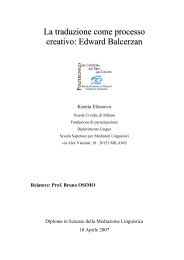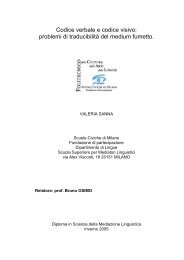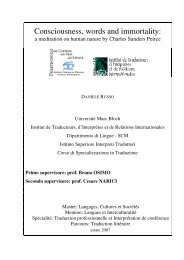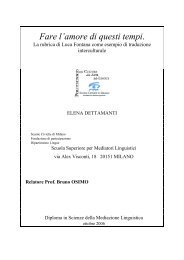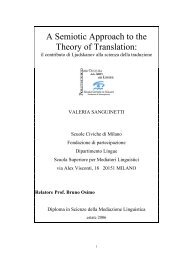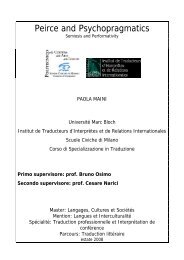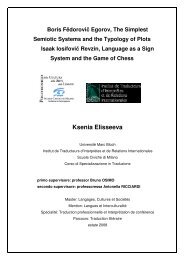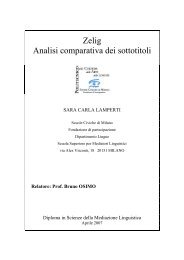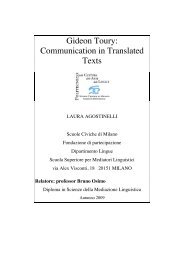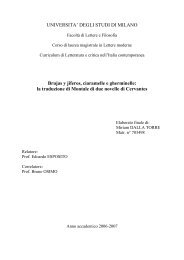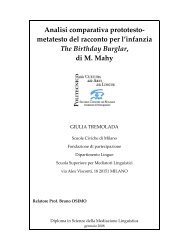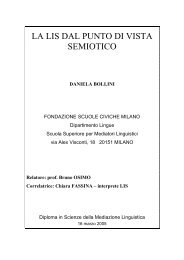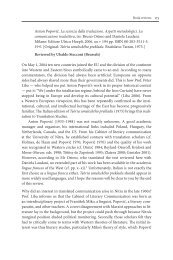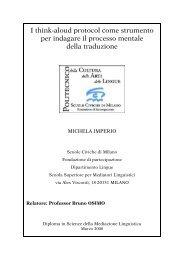Alice in Wonderland - Bruno Osimo, traduzioni, semiotica della ...
Alice in Wonderland - Bruno Osimo, traduzioni, semiotica della ...
Alice in Wonderland - Bruno Osimo, traduzioni, semiotica della ...
You also want an ePaper? Increase the reach of your titles
YUMPU automatically turns print PDFs into web optimized ePapers that Google loves.
<strong>Alice</strong> <strong>in</strong> <strong>Wonderland</strong> – I nomi propri e i giochi di parole:<br />
Christiane Nord<br />
<strong>Alice</strong> <strong>in</strong> <strong>Wonderland</strong> – Proper Names and Puns: Christiane<br />
Nord<br />
ABSTRACT IN ITALIANO<br />
Oltre alla traduzione di un saggio di Christiane Nord che tratta le diverse<br />
possibilità di resa dei nomi propri e le difficoltà connesse alla loro traduzione,<br />
la tesi contiene una prefazione <strong>in</strong> cui i giochi di parole sono suddivisi per<br />
categorie a seconda del meccanismo che li fa funzionare. I giochi di parole<br />
sono strettamente legati al contesto l<strong>in</strong>guistico e culturale <strong>in</strong> cui vengono<br />
creati, e per tale motivo risultano particolarmente difficili da tradurre. Ma<br />
che cosa sono i giochi di parole? Quali sono i meccanismi che li fanno<br />
funzionare? Esistono una o più strategie creative cui essi si possano<br />
ricondurre, ovvero è possibile farne una classificazione? Nel rispondere a tali<br />
<strong>in</strong>terrogativi, questa tesi prende <strong>in</strong> esame un testo particolarmente ricco di<br />
giochi di parole: <strong>Alice</strong>’s Adventures <strong>in</strong> <strong>Wonderland</strong>, un testo che presenta<br />
<strong>in</strong>numerevoli difficoltà traduttive proprio a causa dell’importanza dei suoni e<br />
dei segni dell’orig<strong>in</strong>ale, paragonabile a quella del contenuto denotativo. Tale<br />
considerazione si può fare anche per un altro elemento presente nel<br />
racconto: i nomi propri, che nascondono <strong>in</strong>formazioni o riferimenti alla<br />
cultura o all’ambiente dell’autore. In def<strong>in</strong>itiva però, vista l’<strong>in</strong>traducibilità del<br />
gioco di parole, ossia l’impossibilità di ricrearne uno equivalente all’orig<strong>in</strong>ale<br />
<strong>in</strong> un’altra l<strong>in</strong>gua, si ha la possibilità di apprezzare appieno un gioco di<br />
parole soltanto nell’ambito <strong>della</strong> l<strong>in</strong>gua e <strong>della</strong> cultura che lo hanno creato.<br />
ENGLISH ABSTRACT<br />
Besides present<strong>in</strong>g a translation of an essay by Christiane Nord which deals<br />
with the different possibilities of render<strong>in</strong>g proper names and the relevant<br />
translation difficulties, this thesis conta<strong>in</strong>s a preface where puns are<br />
subdivided <strong>in</strong>to categories accord<strong>in</strong>g to their underly<strong>in</strong>g mechanisms. Puns<br />
are strictly connected to their orig<strong>in</strong>al l<strong>in</strong>guistic and cultural background,<br />
which is the reason why it is so difficult to translate them. But what are<br />
puns? What are the mechanisms that make them work? Are there one or<br />
more creative strategies they might be traced back to, which therefore<br />
could be catalogued? This thesis aims at answer<strong>in</strong>g such questions by<br />
analys<strong>in</strong>g a text which is particularly rich <strong>in</strong> puns: <strong>Alice</strong>’s Adventures <strong>in</strong><br />
<strong>Wonderland</strong>. This text presents <strong>in</strong>numerable translation difficulties because<br />
sounds and signs are just as important as their mean<strong>in</strong>g. The same remark<br />
can be made for another element <strong>in</strong> the story: proper names, which may<br />
hide some <strong>in</strong>formation or reference to the author’s culture and background.<br />
In conclusion, however, s<strong>in</strong>ce puns are practically untranslatable –<br />
recreat<strong>in</strong>g a pun which is the exact equivalent of the orig<strong>in</strong>al is usually<br />
impossible – a pun can be fully appreciated only with<strong>in</strong> the framework of its<br />
orig<strong>in</strong>al language and culture.<br />
3



